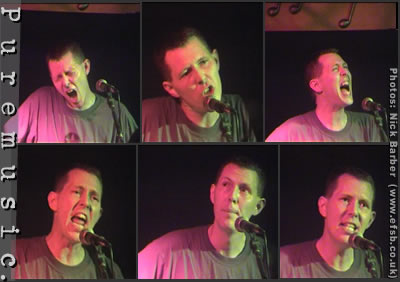
A Conversation with Robbie Fulks (continued)
PM: Speaking of bios, I read yours, but I don't get the picture exactly. I understand you grew up in PA, and then some in the South, Virginia and South Carolina; scholarship to Columbia--that's a good trick, by the way.
[laughter]
PM: Did you make friends in the City that you're still close with today?
RF: In New York? Yeah, a few, just at college. I have a buddy that actually moved down to around Raleigh-Durham, where I was the other week. A lot of them are kind of scattered around now. But I keep up with maybe four or five friends from college.
PM: Right. But not people from the music scene, necessarily?
RF: No. The music scene I was in there, it was like Nashville--it was a case of shoehorning myself into the closest available niche. And in those years, the music I was making wasn't nearly as country as it is now, but there was this scene around Gerde's Folk City and the Speakeasy and the Other End--or the Bitter End, whichever it was called then. And the big acts on that scene then were like Suzanne Vega, Lucy Kaplansky, and those kind of folks.
PM: Sure.
RF: So that was where I was working back then. And I really wasn't friends with any of those guys. They were pretty remote figures to me. I would come in the bar after they finished their set and play for whoever would still be sitting around drinking or whatever.
PM: You never dropped into any of those Jack Hardy meetings of the Fast Folk crowd, or any of that?
RF: No, I didn't. But I really hate scenes and groups--I'm not a joiner--and I think that would have turned me off to that, probably.
PM: Right, right. So what brought you, then, to Chicago in the 80s?
RF: Well, I had a kid by a girl whose parents live here. And after she got pregnant, we had to sort of sit down and figure out what to do. We decided the best thing to do would be to come live with her parents. I moved out here from New York. It was in 1983. And then we got our feet planted in an apartment not long after that. Then we broke up, or she left me. And I just kind of stayed here because the kid was here, and because eventually I put down roots here.
PM: Has that been a good scene for you? Isn't there quite a little country scene there, one is led to believe from afar?
RF: Well, I think it's a little bit over-hyped as far as--you mean like the Bloodshot scene and the old sort of country thing?
PM: Kind of, yeah. And Kelly Hogan, and Neko Case, for starters--
RF: Yeah, Kelly is great. We're good friends and gig together a little bit. But I think it's just a pretty small scene. I haven't been anywhere that compares to Nashville. To me, there are more good craftsmen in Nashville--forgetting about styles of music, just any style of music--there are more good musicians per square yard in Nashville than anywhere else.
PM: It's just unbelievable, yeah.
RF: It really is. More people are incredibly competent at what they do. You go and play a private party or you go to a club, and the sound is professionally run, and people all know what they're doing.
And there are clubs in Chicago, there are tons of good places to play with potentially good sound situations up here, from House of Blues all the way down to Showbiz Fitzgerald's, and like that, for rock and blues and different kinds of music. They got that thing going on. But being a country player in Chicago, it's a little bit lonely. I think there are a dozen people living here that are good at it. You mentioned Kelly, also Don Stierberg, and Scott Rigon and a couple other players and singers.
PM: Right. And they all turn up on the records, because they're the hot dozen.
RF: I think so, yeah. continue
print (pdf) listen to clips puremusic home